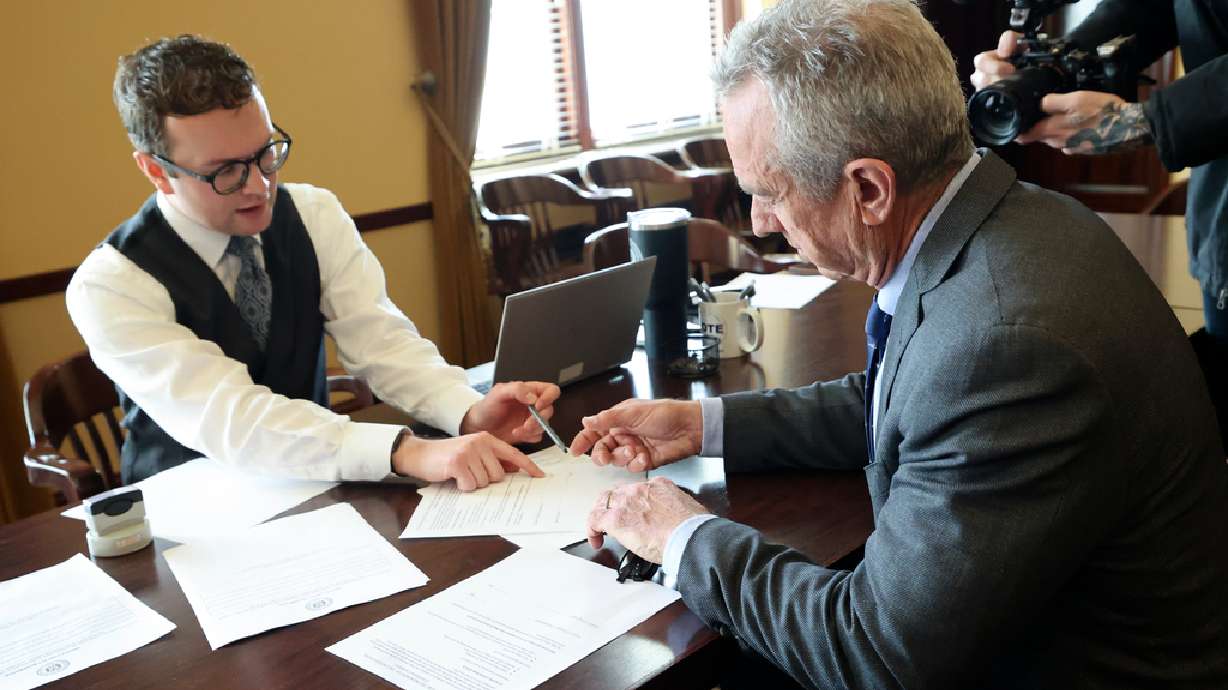Estimated read time: 3-4 minutes
This archived news story is available only for your personal, non-commercial use. Information in the story may be outdated or superseded by additional information. Reading or replaying the story in its archived form does not constitute a republication of the story.
SALT LAKE CITY — Independent presidential candidate Robert F. Kennedy Jr. has gained access to the ballot in Utah, he announced during a press conference at the state Capitol Wednesday.
Kennedy thanked dozens of volunteers in Utah for braving temperatures and sacrificing time during the holiday to collect signatures from 14 different counties in Utah.
"Utah has once again shown that it is the pioneer state," he said. "It is the first of 50 states and the District of Columbia where we are going to register and get on the ballot."
Joe Cook, a Lehi resident and Brigham Young University alum who led the signature gathering efforts in Utah, said the effort grew from only a dozen volunteers to around 100.
"Many voters who signed the petitions were thrilled to hear a message that unites us rather than divides us," Cook said.
Kennedy, an environmental lawyer and anti-vaccine activist who initially ran as a Democratic candidate before he launched an independent campaign, spoke at a rally in Salt Lake City in November, as part of his effort to collect signatures in order to qualify for the state's ballot.
He later complained that Utah's Jan. 8 filing deadline for independent candidates was too restrictive, and didn't provide enough time to gather the necessary 1,000 signatures. Kennedy's campaign sued Lt. Gov. Deidre Henderson and Ryan Cowley, the state's elections director, alleging the deadline was unconstitutional.
Henderson agreed to give independent candidates like Kennedy until March 5 to turn in signatures, an extension Kennedy apparently didn't need as he announced he had collected the requisite petitions last week.

During the press conference, Kennedy frequently railed against the political establishment, which he said favors the two major political parties and what he calls the "undemocratic lock" they have on the process. He thanked Henderson for "cooperating and removing one of the unconstitutional barriers" to ballot access.
Because independent candidates don't go through the same party primary or caucus process as major party candidates, they must petition each state for ballot access, and navigate varying state laws across the nation. Kennedy said his team expects to pay about $15 million in order to qualify across the nation, but said the campaign infrastructure it's building in the process will benefit him come general election time.
"But we're going to be able to do it," he said. "And in the end we're going to have an army in the field of very, very capable people. ... And we're going to have a better army on the street and in the trenches in November of 2024 when we need to get out the vote, and that, in the end, is going to give us an edge in all of these states."
Kennedy's team filed paperwork with the lieutenant governor's office on Wednesday morning.
Utah is the first state in which Kennedy has gained access to the ballot, but his team said he is actively working toward access in Alaska, Arizona, Nevada, Wyoming, Nebraska, Missouri, West Virginia, North Carolina, South Carolina, Maryland, Delaware and New Hampshire. Stefanie Spear, Kennedy's spokeswoman, said the campaign expects Arizona or Missouri to follow Utah in ballot access.
"We're ready for whatever comes our way," she said. "One down, 50 to go."









